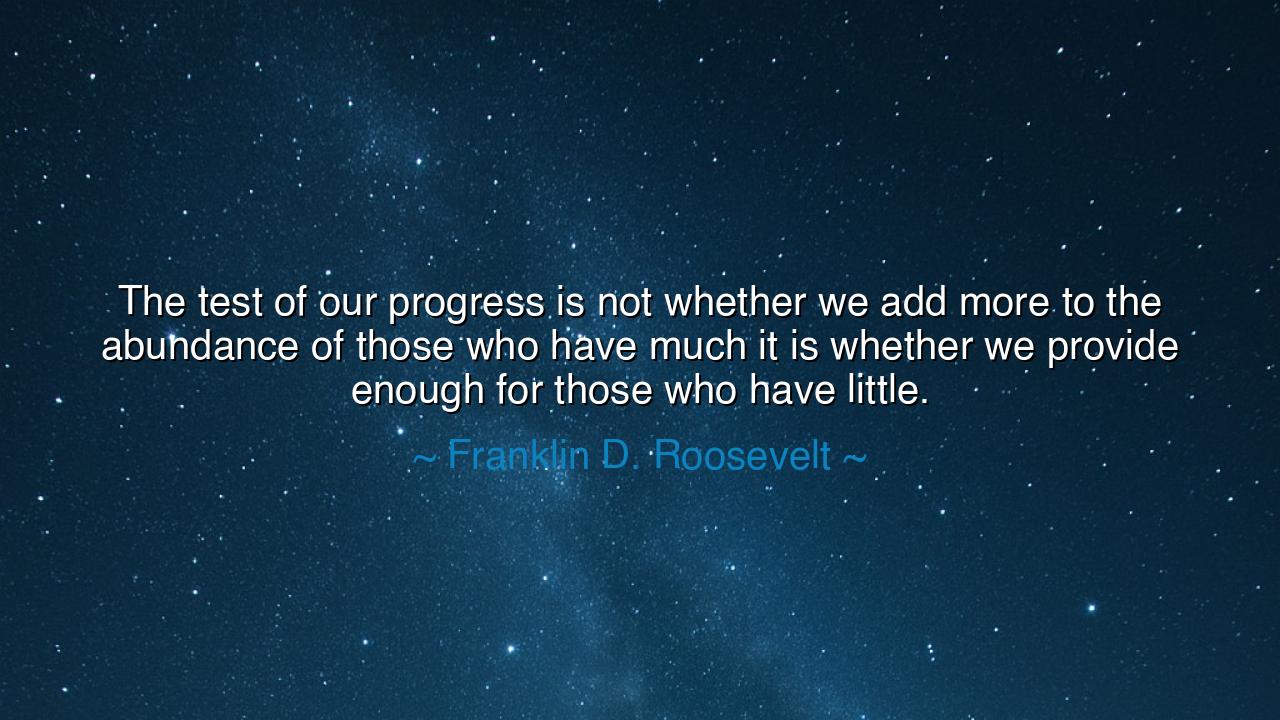
The test of our progress is not whether we add more to the
The test of our progress is not whether we add more to the abundance of those who have much it is whether we provide enough for those who have little.






The words of Franklin D. Roosevelt, spoken in the shadowed years of the Great Depression, ring through time like a solemn bell of conscience: “The test of our progress is not whether we add more to the abundance of those who have much; it is whether we provide enough for those who have little.” In this declaration, the voice of a leader became the echo of humanity itself. It was not spoken to flatter the powerful, but to awaken the compassionate spirit buried in the heart of a wounded nation. Roosevelt reminded the world that true progress is not measured by gold or grandeur, but by the light we bring to those in darkness.
In those years, America had been broken by despair. Fields lay barren, factories silent, and millions wandered jobless, seeking dignity in a land that seemed to have forgotten them. Yet from that ruin rose a leader who did not measure greatness by wealth, but by mercy. Roosevelt’s New Deal was not only a policy—it was a testament to the belief that civilization advances only when it uplifts the weary. He understood that a society is not judged by its palaces, but by how it shelters its poor; not by the abundance of a few, but by the sufficiency of the many.
This quote is not a cry of pity—it is a call to justice. It teaches that abundance without compassion is decay disguised as progress. To add more to those who have much is to build towers without foundations, glittering above while the ground below crumbles. But to provide enough for those who have little is to strengthen the very pillars of humanity. A civilization that forgets the hungry, the homeless, and the hopeless may prosper in wealth, but it will wither in soul. Roosevelt’s words remind us that kindness is not charity—it is the breath of civilization itself.
Consider the story of Eleanor Roosevelt, the First Lady who walked among the poor during those desperate years. She visited the slums and the shantytowns, not as an observer, but as a bearer of empathy. She sat with families who had lost everything and listened—not with the ears of pity, but with the heart of shared humanity. Her courage mirrored her husband’s conviction: that to rebuild a nation, one must first rebuild hope. And in the small acts of compassion she sowed, millions found the strength to believe again. Together, their actions proved that progress is not built upon profit, but upon people.
The ancient wisdom of this teaching lies in balance. In every age, wealth tends to gather in the hands of the few, while want spreads among the many. Yet history shows that the societies which endure are those that remember the sacred duty of equity. Rome fell not because it lacked riches, but because it forgot its poor. Great empires crumble when they feed the body of privilege but starve the spirit of justice. Roosevelt’s message is an eternal safeguard against that ruin—a warning to rulers, leaders, and citizens alike: when we neglect the least among us, we plant the seeds of our own downfall.
The lesson, therefore, is clear and timeless. The measure of progress is not in monuments or markets, but in mercy. True advancement is when every child has bread, every worker has dignity, and every heart has hope. For in lifting the lowly, we lift ourselves. The wealth of a people is not their gold, but their goodness; not the luxury of the few, but the welfare of the many.
Practical action: Let each person become a steward of compassion. In daily life, seek not only to rise, but to raise others. Share what you have, even if it is small. Stand where others are unseen. Support those who build, teach, and heal. For when we choose to provide enough for those who have little—be it food, comfort, or understanding—we weave a fabric of progress stronger than any law or empire. And in that quiet service, we fulfill the ancient truth Roosevelt spoke: that the greatness of a society is not measured by the height of its towers, but by the depth of its humanity.






AAdministratorAdministrator
Welcome, honored guests. Please leave a comment, we will respond soon